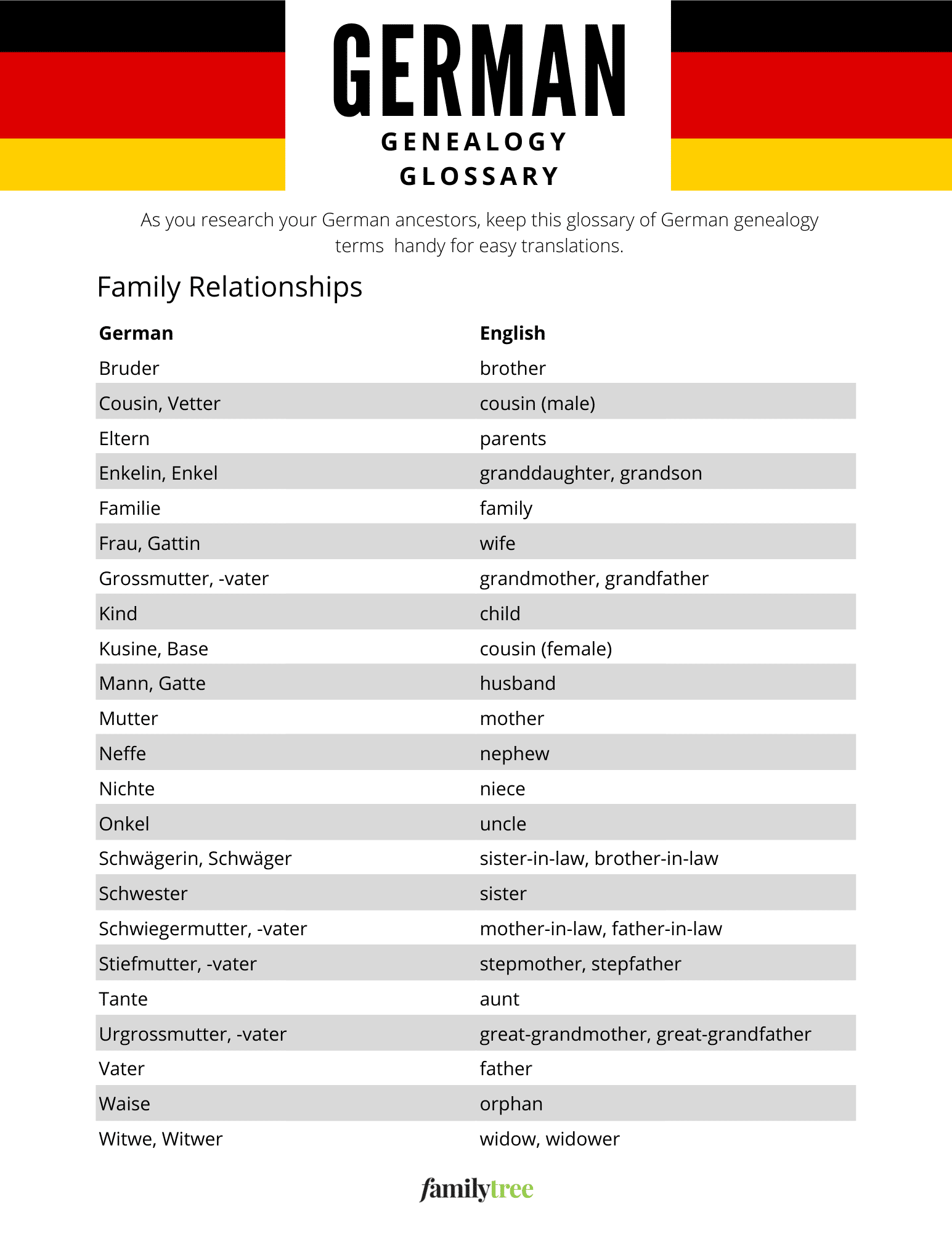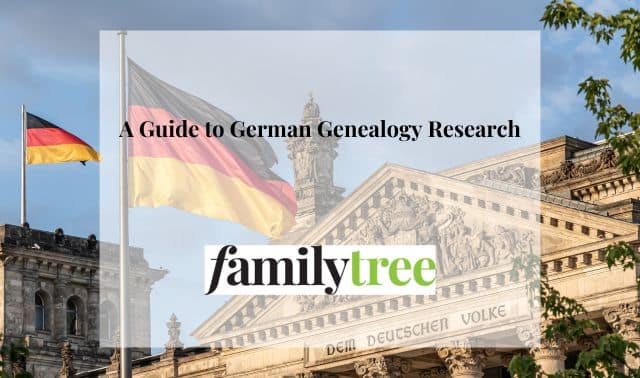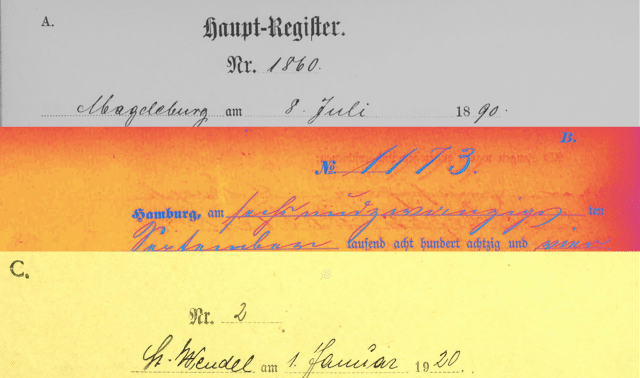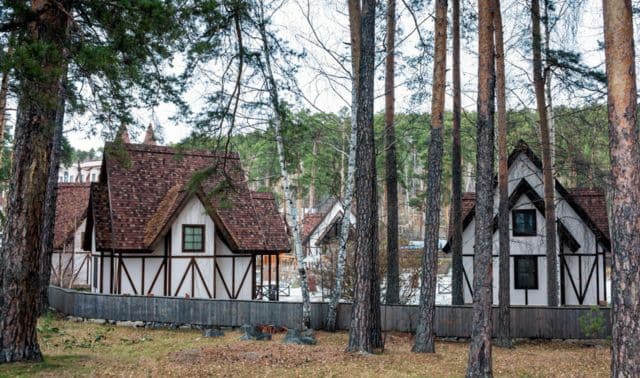
These translations of common German genealogy terms can be a big help when researching your ancestors, from reviewing documents to looking through an old family journal.
Download your free PDF of our German Genealogy Terms Reference Chart by clicking the button below each list. They’re perfect for keeping on your computer desktop or in your research binders!
Jump to:
Numbers
Months and Days
Family Relationships
Essential Genealogy Terms
German Nobility Terms
ADVERTISEMENT
Numbers
| German | English |
| eins | one |
| zwei | two |
| drei | three |
| vier | four |
| fünf | five |
| sechs | six |
| sieben | seven |
| acht | eight |
| neun | nine |
| zehn | ten |
| elf | eleven |
| zwölf | twelve |
| dreizehn | thirteen |
| vierzehn | fourteen |
| fünfzehn | fifteen |
| sechszehn | sixteen |
| siebzehn | seventeen |
| achtzehn | eighteen |
| neunzehn | nineteen |
| zwanzig | twenty |
| dreißig | thirty |
| vierzig | forty |
| fünfzig | fifty |
| sechzig | sixty |
| siebzig | seventy |
| achtzig | eighty |
| neunzig | ninety |
| hundert | one hundred |
| tausend | one thousand |

Get Your Free Genealogy Forms
"*" indicates required fields
Months and Days
| German | English |
| Jahr | year |
| Monat | month |
| Tag | day |
| Januar | January |
| Februar | February |
| Marz | March |
| April | April |
| Mai | May |
| Juni | June |
| Juli | July |
| August | August |
| September | September |
| Oktober | October |
| November | November |
| Dezember | December |
| Montag | Monday |
| Dienstag | Tuesday |
| Mittwoch | Wednesday |
| Donnerstag | Thursday |
| Freitag | Friday |
| Samstag, Sonnabend | Saturday |
| Sonntag | Sunday |

Get Your Free Genealogy Forms
"*" indicates required fields
Family Relationships
| German | English |
| Bruder | brother |
| Cousin, Vetter | cousin (male) |
| Eltern | parents |
| Enkelin, Enkel | granddaughter, grandson |
| Familie | family |
| Frau, Gattin | wife |
| Grossmutter, -vater | grandmother, grandfather |
| Kind | child |
| Kusine, Base | cousin (female) |
| Mann, Gatte | husband |
| Mutter | mother |
| Neffe | nephew |
| Nichte | niece |
| Onkel | uncle |
| Schwägerin, Schwäger | sister-in-law, brother-in-law |
| Schwester | sister |
| Schwiegermutter, -vater | mother-in-law, father-in-law |
| Stiefmutter, -vater | stepmother, stepfather |
| Tante | aunt |
| Urgrossmutter, -vater | great-grandmother, great-grandfather |
| Vater | father |
| Waise | orphan |
| Witwe, Witwer |
widow, widower
|

Get Your Free Genealogy Forms
"*" indicates required fields
Essential German Genealogy Terms
| German | English |
| Akt | document |
| Standesamt | civil registry |
| Taufe | baptism |
| Geburt | birth |
| Ehe, Hochzeit, Heirat | marriage |
| Scheidung | divorce |
| Tod | death |
| Grab | grave |
| Bestattung | burial |
| Vorname | first name |
| Name, Zuname, Familienname | surname |
| Geburtsname, Mädchenname | maiden name |
| Stadt | city |
| Dorf | small town |
| Land | state |
| Bezirk, Kreis | district |
| Pfarrei, Kirchspiel, Gemeinde | parish |

Get Your Free Genealogy Forms
"*" indicates required fields
German Nobility Terms
Fürstentum: Principality—that is, a territory ruled by a Fürst, German for prince.
Grafschaft: Often translated as “county,” which gives an incorrect sense of the word in English. A Grafschaft was ruled by a Graf, German for count, so “countship” might be a better translation.
Gross Herzogtum: Grand duchy
ADVERTISEMENT
Herrschaft: Land ruled by a local lord, or Herr.
Herzogtum: German for duchy, ruled by a Herzog (duke).
Königreich: Territory ruled by a König (king). In deference to the Holy Roman Emperor, only the king of Bohemia was allowed this title within the empire until the Elector of Brandenburg conquered Prussia. Initially, the elector could use only the title “King in Prussia” because the Prussian lands were considered outside the empire’s jurisdiction.
Kurfürstum: A principality whose prince was also one of the electors of the Holy Roman Emperor. The prefix Kur– was also sometimes added to the name of an elector’s territory, such as Kurpfalz for the “electoral Palatinate.”
Reichstadt: A free imperial city of the Holy Roman Empire.
Rittergut: A knight’s estate, which at times was an independent territory.

Get Your Free Genealogy Forms
"*" indicates required fields
ADVERTISEMENT




